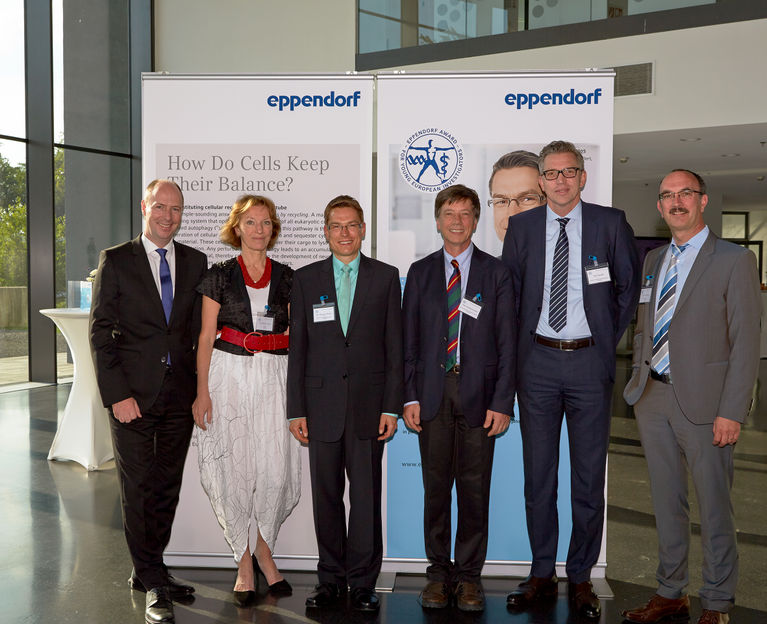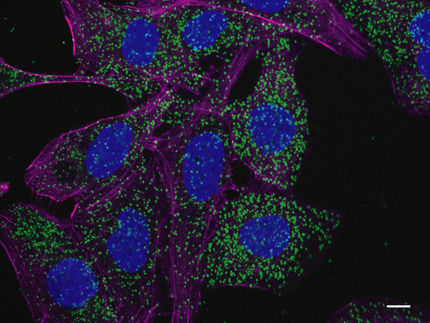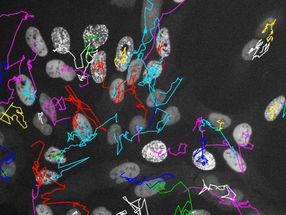This year’s research prize awarded by Eppendorf goes to Germany
Presentation of the 2015 Eppendorf Award for Young European Investigator to Thomas Wollert
In 2015 Eppendorf AG, the Hamburg life science company is presenting its research prize for the 20th time. The independent Eppendorf Award Jury chaired by Prof. Reinhard Jahn selected Dr. Thomas Wollert (Research Group Leader at the Max Planck Institute of Biochemistry in Martinsried, Germany) as the 2015 winner of the Eppendorf Award for Young European Investigators.

Eppendorf Award 2015 Prize Ceremony (from left to right): Wilhelm Plüster (Eppendorf AG), Maria Leptin (EMBO), Award Winner 2015: Thomas Wollert (Max Planck Institute of Biochemistry), Reinhard Jahn (MPI for Biophysical Chemistry), Axel Ziemke (Eppendorf Vertrieb Deutschland GmbH), Axel Jahns (Eppendorf AG)
©EMBL Photolab
Thomas Wollert, born 1979, receives the € 20,000 prize for his groundbreaking work in reconstituting complex intracellular membrane events in the test tube using artificial membranes and purified components. His experiments have paved the way for understanding key steps in autophagy, a fundamental process required for the clearance of damaged cell parts in all eukaryotic cells. According to the Jury, these discoveries also harbor the potential for refined drug development since malfunction of autophagy is emerging as a critical event in the development of various diseases.
The Award ceremony took place at the EMBL Advanced Training Centre in Heidelberg, Germany, on June 25, 2015. The laudatio honoring Thomas Wollert’s achievements was held by the jury chairman Prof. Reinhard Jahn.
In his presentation, Thomas Wollert explained what autophagy is and which approaches he and his group Molecular Membrane and Organelle Biology are using to reveal how cells recycle damaged or superfluous components.
Thomas Wollert: “The major mission of my laboratory is to reveal the molecular mechanism of autophagy. We produce components of the autophagic recycling machinery and assemble them at model membranes to reveal their function. Our goal is to recapitulate autophagy in the test tube to understand how autophagy operates and what goes wrong in neurodegenerative diseases and cancer.” … “This prestigious Award honors the hard work of my laboratory and represents a major acknowledgement of our efforts aiming to decipher how cells maintain their homeostasis by autophagy. I am particularly grateful that our unusual bottom-up approach, which is based on biophysics in combination with biochemistry and cell biology, is being recognized by this Award.”
With the Eppendorf Young Investigator Award, which was established in 1995, Eppendorf AG honors outstanding work in biomedical research and supports young scientists in Europe up to the age of 35. The Eppendorf Award is presented in partnership with the scientific journal Nature. The Award winner is selected by an independent committee composed of Prof. Reinhard Jahn (Max Planck Institute for Biophysical Chemistry, Göttingen, Germany), Prof. Dieter Häussinger (Clinic for Gastroenterology, Hepatology and Infectiology, Düsseldorf, Germany), Prof. Maria Leptin (EMBO, Heidelberg, Germany), and Prof. Martin J. Lohse (Institute for Pharmacology and Toxicology, University of Würzburg, Germany).
Most read news
Other news from the department science

Get the life science industry in your inbox
By submitting this form you agree that LUMITOS AG will send you the newsletter(s) selected above by email. Your data will not be passed on to third parties. Your data will be stored and processed in accordance with our data protection regulations. LUMITOS may contact you by email for the purpose of advertising or market and opinion surveys. You can revoke your consent at any time without giving reasons to LUMITOS AG, Ernst-Augustin-Str. 2, 12489 Berlin, Germany or by e-mail at revoke@lumitos.com with effect for the future. In addition, each email contains a link to unsubscribe from the corresponding newsletter.





















































